Aromatherapy harnesses the power of essential oils to enhance your mood and well-being through your brain's direct response to scent. When you breathe in these natural compounds, they trigger your limbic system to release feel-good neurotransmitters like serotonin and dopamine. You'll find oils like lavender can calm anxiety, while citrus oils boost happiness and peppermint sharpens focus. It's a practice backed by both ancient wisdom and modern science, with studies confirming these oils' effects on emotions, memory, and physical health. There's an entire world of natural aromatherapy solutions waiting to transform your daily wellness routine.
Key Takeaways
- Essential oils stimulate the limbic system through scent molecules, triggering the release of mood-enhancing neurotransmitters like serotonin and dopamine.
- Citrus oils, particularly lemon and orange, naturally elevate mood and reduce stress hormones through their bright, uplifting aromas.
- Scientific studies confirm aromatherapy's effectiveness in reducing anxiety, enhancing sleep quality, and improving mental performance.
- Morning rituals with invigorating blends of citrus and peppermint promote mental clarity and positive emotional states.
- Evening relaxation techniques using lavender, chamomile, and vanilla create calming environments that reduce stress and promote happiness.
The Science Behind Aromatherapy
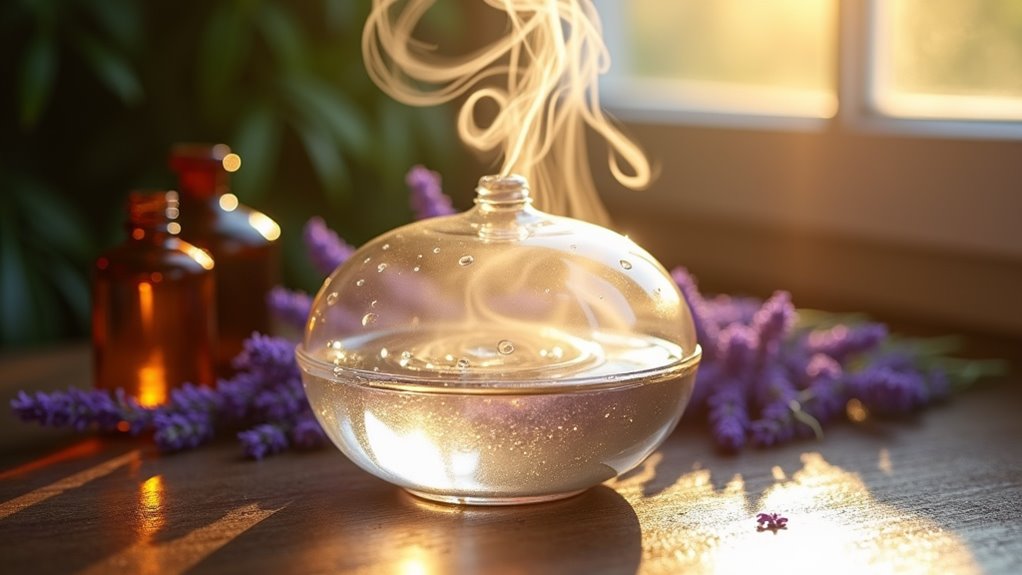
While many people view aromatherapy as purely an alternative wellness practice, scientific research has revealed how essential oils interact with the body's systems.
When you inhale essential oils, their molecules travel through your nose to the limbic system, which controls emotions, behavior, and memory. These aromatic compounds can trigger the release of neurotransmitters like serotonin and dopamine.
You'll find that essential oils also work through skin absorption. When applied topically, their small molecular structure allows them to penetrate your skin layers and enter your bloodstream.
This process can influence your body's physiological responses, including heart rate, blood pressure, and immune function. Recent studies have shown that certain oils possess antimicrobial, anti-inflammatory, and anxiety-reducing properties, supporting their traditional therapeutic uses.
Essential Oils Through History
The therapeutic use of aromatic plants dates back thousands of years before modern science explained their effects on our bodies. You'll find evidence of essential oils in ancient Egyptian hieroglyphics, where they're depicted in religious ceremonies and medical treatments.
The Greeks and Romans later adopted these practices, using aromatic oils for massage and bathing.
In medieval times, you'd see monks cultivating herb gardens and distilling essential oils for medicinal purposes. During the bubonic plague, people wore posies containing aromatic herbs for protection.
By the 1900s, French chemist René-Maurice Gattefossé discovered lavender's healing properties after treating his burned hand, leading to modern aromatherapy.
Today, you're benefiting from this rich history as essential oils continue to play a vital role in alternative medicine and wellness practices.
Understanding Your Brain's Scent Response
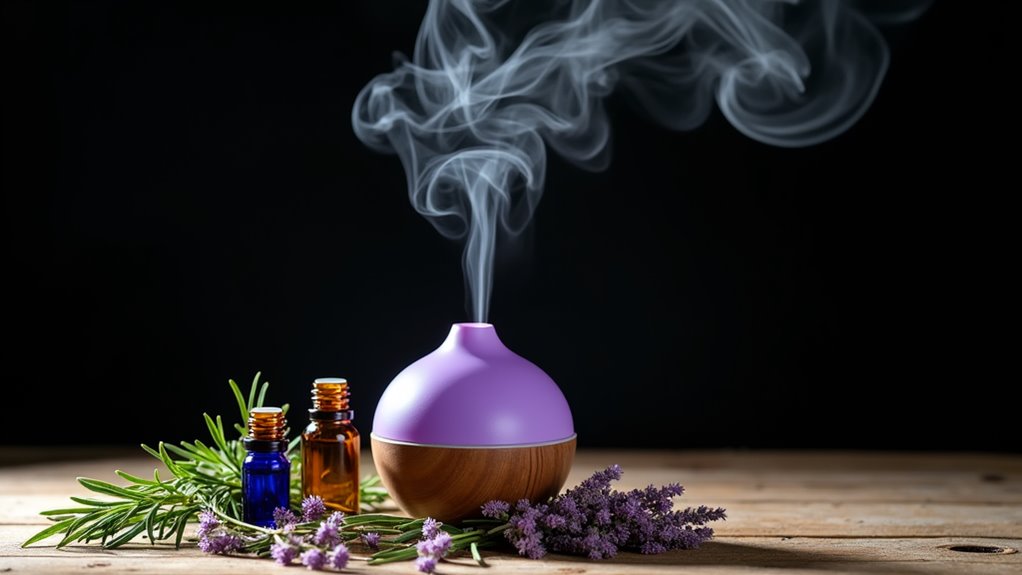
Your brain processes scents differently from other sensory information, creating direct pathways between smell and emotion.
When you inhale aromatherapy oils, the scent molecules travel through your nose to the olfactory bulb, which connects directly to your limbic system – the emotional center of your brain.
Unlike other senses that must first pass through the thalamus, scents bypass this filtering process.
That's why you'll often experience an immediate emotional reaction to smells before you've even consciously identified them.
Your amygdala and hippocampus play crucial roles in this process, linking scents to memories and triggering emotional responses.
This direct connection explains why certain aromas can instantly calm you down, energize you, or transport you to a specific memory from your past.
Top Essential Oils Benefits
You'll find essential oils can enhance your mind-body wellness through their ability to reduce stress, improve mood, and promote relaxation.
Your immune system benefits when you use specific oils like tea tree, eucalyptus, and oregano, which have natural antimicrobial properties.
Whether you're fighting seasonal threats or seeking emotional balance, these powerful plant extracts work with your body's natural processes to support overall health.
Mind-Body Balance Benefits
Essential oils provide powerful support for achieving mental and emotional equilibrium, offering a natural pathway to reduce stress and anxiety while promoting overall well-being. When you incorporate aromatherapy into your daily routine, you'll find that certain scents can lift your mood, enhance focus, and create a sense of calm.
Lavender helps you unwind after a long day and improve sleep quality, while peppermint sharpens your mental clarity and boosts energy levels.
You'll notice that citrus oils like lemon and orange can elevate your mood and reduce feelings of depression. Rosemary stimulates memory and concentration, making it perfect for work or study sessions.
Immune System Support Uses
Three powerful essential oils stand out for their immune-boosting properties: tea tree, eucalyptus, and oregano. When you're looking to strengthen your body's natural defenses, these oils can be valuable allies in your wellness routine.
Tea tree oil contains antimicrobial compounds that help fight off harmful bacteria and viruses, while eucalyptus supports respiratory health and reduces inflammation.
You'll find that oregano oil packs a powerful punch with its high levels of carvacrol and thymol, natural compounds known for their immune-enhancing effects. You can use these oils in several ways: add them to a diffuser, mix with carrier oils for topical application, or incorporate them into your cleaning routine.
For best results, you should rotate between these oils and use them consistently during cold and flu season.
Methods of Using Essential Oils
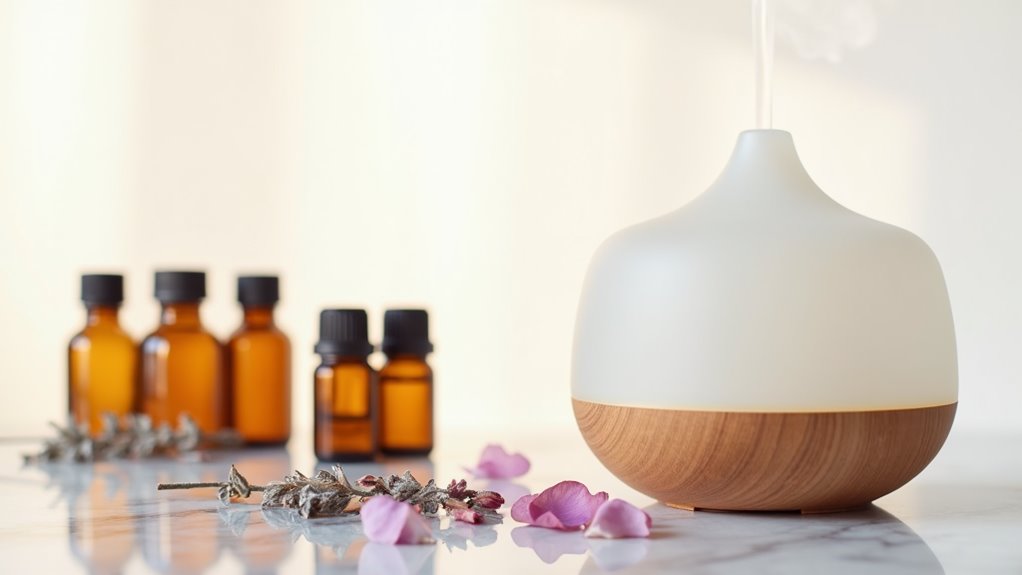
Popular aromatherapy practices involve multiple methods for using essential oils, each suited to different purposes and preferences. You can inhale oils directly from the bottle, add them to a diffuser for room-wide dispersion, or blend them with carrier oils for topical application.
Steam inhalation works well for respiratory benefits – just add a few drops to hot water and breathe deeply.
For skin application, you'll need to dilute essential oils properly. Mix them with carrier oils like coconut or jojoba before applying to your body. You can also add oils to your bath, create therapeutic massage blends, or make natural cleaning products.
Remember that some methods, like internal consumption, should only be done under professional guidance, as essential oils are highly concentrated and potent.
Safety and Best Practices
Safe aromatherapy requires five fundamental practices that protect your wellbeing.
First, always dilute essential oils in a carrier oil before applying them to your skin, using a 2-3% dilution ratio.
Second, perform a patch test on a small area of skin before using any new oil.
Third, keep oils away from your eyes and never ingest them unless directed by a qualified practitioner.
Fourth, store your oils in dark glass bottles away from direct sunlight and heat.
Finally, research each oil's contraindications, especially if you're pregnant, nursing, or have medical conditions.
Remember that essential oils are highly concentrated plant compounds.
You'll need to be particularly careful with citrus oils, which can cause photosensitivity, and "hot" oils like cinnamon or clove, which may irritate sensitive skin.
Blending Oils for Maximum Effect
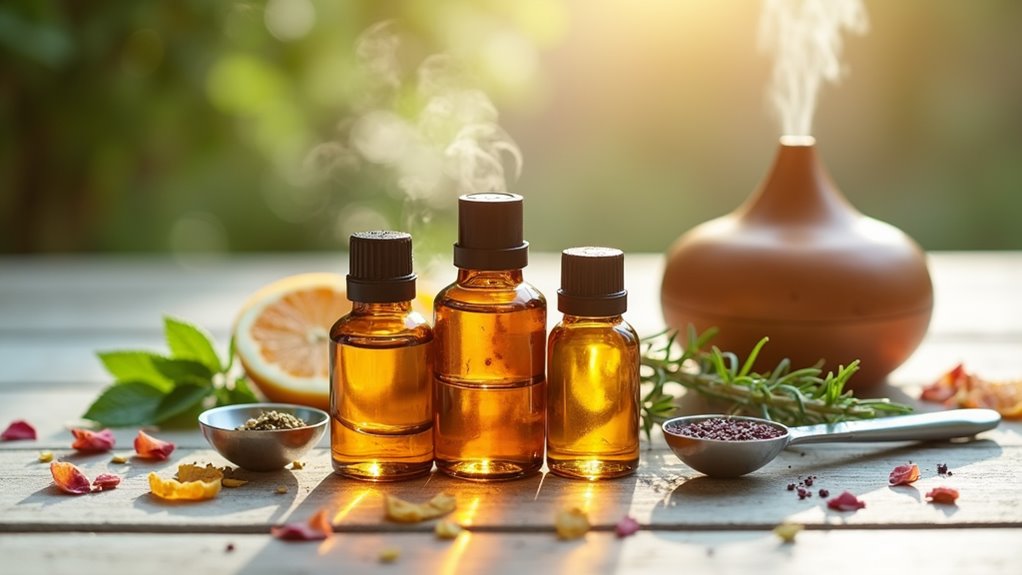
Creating effective oil blends combines both art and science to maximize therapeutic benefits. You'll need to understand both the properties of individual oils and how they interact with each other.
Start by selecting a base oil, typically accounting for 50-80% of your blend, then add complementary oils that target your specific needs.
For optimal results, you'll want to follow the rule of three: combine no more than three essential oils in your initial blends.
Consider the notes – top, middle, and base – when mixing oils to create a balanced aroma. Always measure carefully using drops, and keep detailed notes of your combinations.
You can adjust the ratios until you find your perfect blend, but remember that stronger isn't always better.
Aromatherapy for Mental Wellness
Research has shown that aromatherapy can significantly impact your mental well-being through its effects on the limbic system. When you inhale essential oils, they interact with your brain's emotional center, helping regulate mood, stress, and anxiety levels.
You'll find lavender particularly effective for reducing anxiety and improving sleep quality, while citrus oils like bergamot and lemon can boost your mood and energy levels.
Rosemary enhances mental clarity and memory, making it perfect for your workspace. If you're dealing with depression, try uplifting oils like ylang-ylang or geranium.
For best results, you should incorporate aromatherapy into your daily wellness routine. Whether it's diffusing oils during meditation, adding them to your bath, or carrying a personal inhaler, consistent use will help support your emotional balance and mental health.
Daily Aromatherapy Rituals
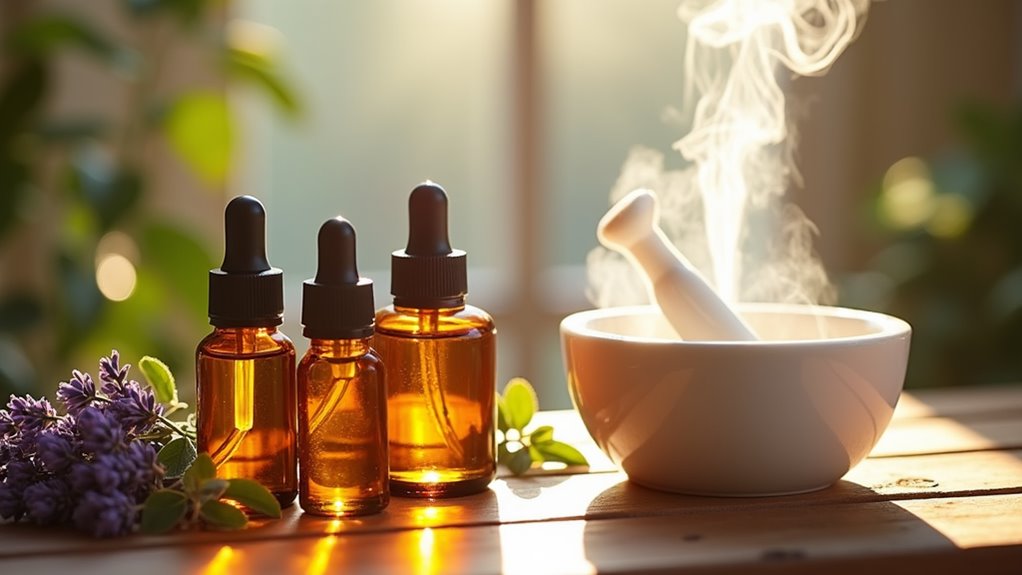
You can transform your daily routine by incorporating essential oils that match your body's natural rhythms.
Start your morning with invigorating citrus or peppermint oils to boost energy and mental clarity.
At night, you'll find lavender, chamomile, or vanilla blends help signal your body it's time to unwind and prepare for sleep.
Morning Energizing Essential Oils
Starting your day with energizing essential oils can transform your morning routine into an invigorating ritual.
You'll find that citrus oils like lemon, orange, and grapefruit provide an instant mood boost and mental clarity. Add a few drops of peppermint or eucalyptus to your diffuser for enhanced focus and respiratory support.
For a powerful morning blend, combine rosemary with wild orange to stimulate your mind while reducing stress.
You can also add these oils to your shower by placing 2-3 drops on the shower floor, creating an aromatic steam experience. If you're feeling sluggish, try dabbing a drop of cinnamon or bergamot on your pulse points.
Just remember to dilute these oils properly with a carrier oil before applying them to your skin.
Evening Relaxation Blends
When bedtime approaches, creating a calming atmosphere with essential oils can help signal your body and mind to unwind.
You'll find that lavender, chamomile, and vanilla are particularly effective for evening relaxation. Mix 3 drops of lavender with 2 drops of chamomile in your diffuser for a gentle sleep-inducing blend.
For a deeper sense of tranquility, try combining bergamot and ylang-ylang with cedarwood. These oils work together to reduce anxiety and promote peaceful sleep.
You can also create a pillow spray by adding 5 drops of your chosen blend to 2 ounces of water in a small spray bottle. Mist your pillowcase lightly 10 minutes before bed.
Remember to keep your evening blends subtle – you're aiming for gentle relaxation rather than overwhelming scents.
Research and Clinical Studies
Although aromatherapy has been used for centuries, modern scientific research has begun to validate its therapeutic effects.
You'll find numerous clinical studies showing how lavender oil reduces anxiety and improves sleep quality, while peppermint enhances mental alertness and physical performance.
Research published in prominent medical journals demonstrates that tea tree oil possesses powerful antimicrobial properties, effectively fighting bacteria and fungi.
You can also look at studies revealing how citrus oils boost mood and reduce stress hormones in the body.
Recent neuroimaging research shows that certain essential oils affect brain activity patterns, particularly in areas associated with emotion and memory.
While more research is needed, you'll discover that scientific evidence continues to support many traditional claims about aromatherapy's benefits for physical and psychological well-being.
Frequently Asked Questions
Can I Use Aromatherapy While Pregnant or Nursing?
You'll need to be extra cautious with aromatherapy during pregnancy and nursing. While some essential oils are safe, others can be harmful.
Avoid oils like rosemary, clary sage, and jasmine during pregnancy, as they can trigger contractions.
When nursing, steer clear of peppermint, which may reduce milk supply.
Always consult your healthcare provider first and use gentle dilutions of pregnancy-safe oils like lavender and chamomile.
How Long Do Essential Oils Remain Effective After Opening?
Like a fine wine that loses its complexity when left uncorked, essential oils begin to deteriorate once opened.
You'll get the best results from your oils within 1-2 years after opening, though citrus oils typically last only 6 months.
To maximize their shelf life, store them in dark glass bottles away from sunlight and heat, and keep the caps tightly sealed when not in use.
Why Do Some People Get Headaches From Certain Essential Oils?
You might get headaches from essential oils due to several factors.
Some oils are naturally stimulating and can trigger sensitivity, especially if they're too concentrated.
You could also be having an allergic reaction to specific compounds in the oils.
Your personal sensitivity to strong scents plays a role, and if you're using poor-quality oils or applying them incorrectly, they're more likely to cause headaches.
Can Pets Be Harmed by Aromatherapy Diffusers in the Home?
Yes, essential oils can be harmful to your pets.
Your cats and dogs have much more sensitive noses than humans, and many oils are toxic to them. Tea tree, citrus, pine, and eucalyptus oils are especially dangerous.
If you're using a diffuser, make sure your pets can leave the room, keep diffusing times short, and dilute oils properly. It's best to check with your vet about which oils are safe.
Does the Brand or Price of Essential Oils Affect Their Therapeutic Value?
While a high price tag doesn't guarantee quality, cheap essential oils can be diluted or synthetic, offering little therapeutic benefit.
You'll want to focus on purity rather than brand names. Look for oils that include the plant's Latin name, sourcing details, and extraction method on their labels.
Third-party testing certificates and transparent companies will give you better value than fancy packaging or marketing claims.
Conclusion
Like a key unlocking nature's medicine cabinet, aromatherapy opens doors to your well-being. You'll find that these precious plant essences can transform your daily rituals into powerful moments of healing. Just as a garden needs nurturing to bloom, your journey with essential oils requires patience and understanding. When you embrace aromatherapy's ancient wisdom, you're not just inhaling scents – you're breathing in centuries of natural healing potential.
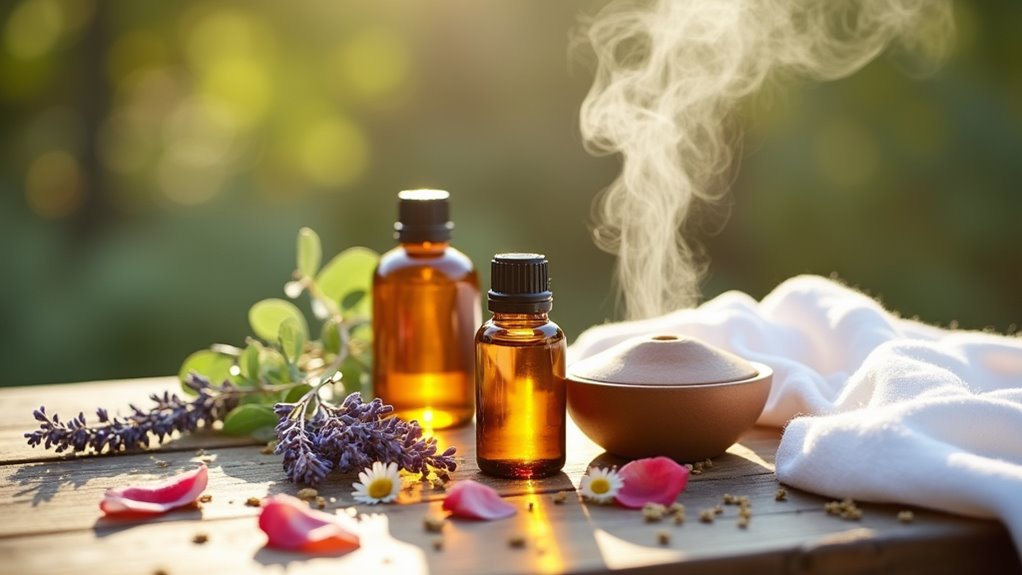
Leave a Reply